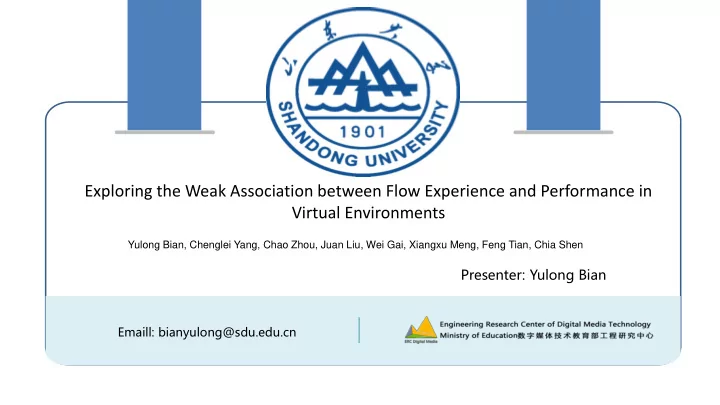

Exploring the Weak Association between Flow Experience and Performance in Virtual Environments Yulong Bian, Chenglei Yang, Chao Zhou, Juan Liu, Wei Gai, Xiangxu Meng, Feng Tian, Chia Shen Presenter: Yulong Bian Emaill: bianyulong@sdu.edu.cn
Is experience important in VE? Is performance important in VE? www.rapidppt.com
Flow experience Optimal experience Flow experience represents a highly enjoyable mental state where the individual is fully immersed and engaged in the process of the activity. www.rapidppt.com
Higher level Lower level Flow Flow Performance Performance experience experience www.rapidppt.com
VEs and some other computer mediated environment ( CME ) Flow Flow Performance Performance experience experience The main purpose of this study is to understand the reasons of the weak association, and to propose approaches that can alleviate the weak association problem in VE designs. www.rapidppt.com
Building Theoretical Model www.rapidppt.com
Flow antecedents Flow consequences Task Flow Experience Person experience Artifacts Performance Traditional flow model for non-virtual activities www.rapidppt.com
Flow antecedents Flow consequences Task Flow Experience Person experience Artifacts Performance Traditional flow model for non-virtual activity Flow antecedents Flow consequences Task Flow Experience Person experience Artifacts Performance PAT model for computer-mediated activity www.rapidppt.com
, Computer Interactive systems tools Artifact Display Virtual devices contents Flow antecedents Flow consequences 1 Task Flow Experience Person experience Artifacts 2 Performance PAT model for computer-mediated activity www.rapidppt.com
Other positive activity experience Flow antecedents Flow consequences Task Flow Experience Person experience Artifacts Performance Traditional flow model (No-Virtual activities) Flow antecedents Flow consequences 1 Task Flow Experience Person experience Artifacts 2 Performance PAT model for computer-mediated activity (Virtual activities) www.rapidppt.com
Empirical study 1 A STUDY EXPLORING WEAK ASSOCIATION BETWEEN FLOW AND PERFORMANCE IN VE ACTIVITIES www.rapidppt.com
Hypothesis In VEs where the artifacts are incongruent with the primary task, the relationship between flow and activity experience maybe strong, but relationship between flow and performance is weak. Virtual Tai Chi training (activity 1) VR shooting game (activity 2) www.rapidppt.com
Interactive device Pedagogical agent 3D animation demonstration (A Smartphone-based fixed on the forearm ) Disjointing feature The way of using interactive artifacts are disjointed from the primary task. Artifacts are numerous and disjointed with A primary task. B The interactions are not intuitive The Tai Chi training studio www.rapidppt.com
3D scene A simulation gun Stereoscopic glasses Disjointing feature The function of interactive artifacts disjointed with the context and requirements of the primary task A The number of bullets is unlimited B The player is invincible VR shooting game (activity 2) www.rapidppt.com
Measures Flow experience Valid questionnaires Positive Learning affects satisfaction Learning experience Intrinsic Self-efficacy interest The activity 1 Performance Expert evaluation www.rapidppt.com
Measures Flow experience valid questionnaires Satisfaction Playfulness Game experience Game Presence motivation The activity 2 Game scores were Performance recorded by the system www.rapidppt.com
Results Structural equation modeling (SEM) analysis Structural equation model 1 (activity 1) www.rapidppt.com
Structural equation modeling (SEM) analysis Structural equation model 2 (activity 2) www.rapidppt.com
Discussion Activity experiences Engagement in primary task 1 Flow Using interactive artifacts Performance Disjointing features Operating the interactive artifacts themselves is overtly fascinating, A complicated or non-intuitive. 2 B The function/ content of interactive artifacts is disjoint with the context and requirements of the task. www.rapidppt.com
Empirical study 2 A STUDY OF A POTENTIAL APPROACH TO STRENGTHEN THE WEAK ASSOCIATION www.rapidppt.com
Hypothesis Hypothesis Study 2 Flow can significantly and positively influence game performance in a VE where the interaction design and the primary task are appropriately congruent. A VR simulated driving game www.rapidppt.com
Steering wheel Pedals A vehicle motion simulator Congruence feature The using of interactive artifacts is easy and intuitive, A thus it does not distract users’ attention from performing the primary task B The interactive content is congruent with the context and requirements of the primary task www.rapidppt.com
Flow experience was measured with valid Flow experience questionnaires. β =0.524, p <0.001 β =0.457, ΔR 2 =27.1, p <0.01 (Control the preexisting experience) Performance Game scores were recorded by the system. www.rapidppt.com
Empirical study 3 A CASE STUDY OF IMPROVING THE ASSOCIATION BETWEEN FLOW AND PERFORMANCE www.rapidppt.com
Hypothesis Hypothesi Study 3 Study 2 s Our proposed interaction design guideline are effective in optimizing VR game. 3D glasses Kinect A simulated racket VR tennis game www.rapidppt.com
Old version (Disjointed) New version (Jointed) The interaction is not sufficiently natural We optimized the return stroke trajectory and intuitive. to reflect the player's true intention. We modified the tennis racket design so When hitting the ball by waving the racket, the that the ball hitting experience became return of the ball is set on a simplistic trajectory more natural. that does not reflect the player’s intention. The interactive content is disjoint with the context and requirements of the primary We changed the fixed view point to a task. dynamic moving viewpoint, i.e. player’s view point changed according their body The viewpoint of the player is fixed and does not position in real time. change with the real-time body movement of the player. www.rapidppt.com
Results Old version (1) New version (2) Flow experience Flow experience Game experiences were measured with valid questionnaires. (β=0.334, p=0.103) (β=0.470, p=0.018 ) Performance Performance Game scores were recorded by the system. Weak association Strong association www.rapidppt.com
Conclusions 2 1 3 We verify an approach for A theoretical model They have practical strengthening the implications in explaining the mechanism relationship between flow optimizing VE design. of weak association and performance in VE www.rapidppt.com
Limitations and future work 02 01 The sample sizes are We used games of small. different genres in the 3 studies. The small sample sizes may affect the reliability or The VE genres might lead to stability of the outcomes. extra variables . The Therefore, our findings may potential effect of VE genres need to be further tested needs to be tested in future with larger samples work. www.rapidppt.com
THANKS Presenter: Yulong Bian CHI 2018, April 20 th , 2018 Emaill: bianyulong@sdu.edu.cn
Recommend
More recommend